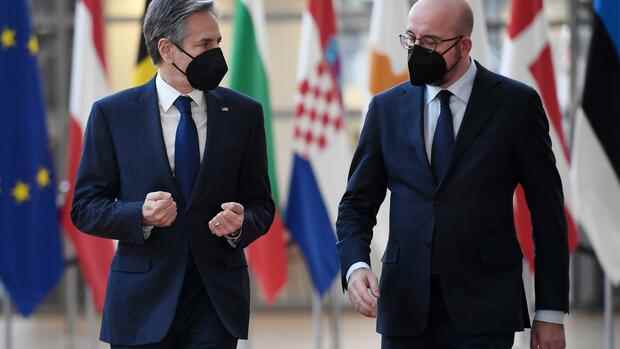“We are not looking for conflict,” said US Secretary of State Antony Blinken. “But if the conflict comes to us, then we are ready.”
(Photo: AP)
Brussels Actually, the matter is clear: NATO is a defense alliance, which means that it always acts defensively: if a member state is attacked, the others rush to its aid and support it in its defense. The alliance does not attack on its own – not even pre-emptively, should imminent danger threaten.
But: In the Balkan war, NATO intervened, although none of the NATO countries were affected – and there was no mandate from the United Nations. When the threat of genocide against the Kosovar Albanians loomed, it was seen as a moral duty to take action against the Serbs.
Since there are also signs of a Russian war of annihilation in Ukraine, there is a discussion: Should NATO intervene? Does she have to?
It’s a tricky question. Aside from the suffering of the Ukrainians, a Russian victory would pose a major problem for the western world: a Russian-dominated Ukraine would be an enduring security problem for the European continent.
Top jobs of the day
Find the best jobs now and
be notified by email.
“The coming days are likely to be even worse, with more death, more suffering and more destruction,” NATO Secretary General Jens Stoltenberg said after the NATO foreign ministers’ meeting on Friday. Nevertheless, he rejected a no-fly zone over Ukraine monitored by NATO, which the government in Kyiv had asked for.
War should not escalate further
“As NATO, we have a duty to ensure that the war does not escalate beyond Ukraine,” Stoltenberg clarified several times. That is why no NATO soldiers will be sent to Ukrainian soil or into the airspace. If the conflict spreads to NATO level, there will be more deaths, more suffering, more destruction, he warned.
>> Also read here: Baerbock: “NATO was never a threat to Russia”
The Norwegian politician did not use the words “World War III” or “nuclear war”, but that is exactly what it is about. The enemy this time is not a small Serbia like in the Balkan war, but a nuclear power.
Instead, Ukraine will continue to be supported with arms deliveries. The longer the Ukrainians hold out and the more Russia is weakened, the higher the likelihood of diplomatic negotiations.
That is why the alliance partners continue to focus on isolating Russia economically and diplomatically, and are planning further measures. “We must put maximum pressure on Putin. It’s the only way to stop this man,” Canadian Foreign Minister Mélanie Joly said before the meeting.
Could attacks on nuclear power plants force a rethink?
Nevertheless, the question remains: how to deal with targeted attacks on nuclear power plants? A nuclear catastrophe would also directly threaten the NATO countries. Such attacks could therefore be interpreted as attacks on NATO territory.
For example, Friedrich Merz, CDU party and Union faction leader in the Bundestag, said: “The attacks and the way in which this war is being waged are taking on forms that make you think.”
These are also considerations that are being discussed within NATO, but so far there has been a reluctance to make concrete statements. One prefers to stick with threats of deterrence: “We are not looking for a conflict,” said US Secretary of State Antony Blinken. “But if the conflict comes to us, then we are ready.”
More: “A tank is now also a defensive weapon” – Ukraine’s ambassador calls for further arms deliveries from Germany
